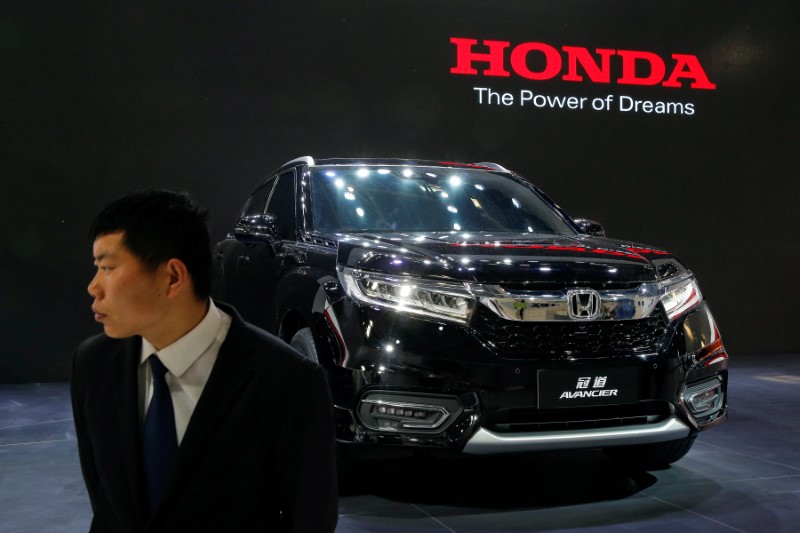By Jake Spring and Norihiko Shirouzu
BEIJING (Reuters) - Global automakers reported a surge in China sales last year as consumers rushed to take advantage of a tax cut on small-engine cars, but cautioned 2017 would be tougher for the industry as the incentive is rolled back and the broader economy slows.
Toyota Motor Corp, Ford Motor Co and Nissan Motor Co Ltd on Friday each reported sales growth of 8 percent or better for 2016, although Honda Motor Co Ltd led the pack with a 24 percent growth.
Toyota, which reported an 8.2 percent rise in China sales last year, sees growth slowing in 2017 as slightly higher taxes keep some buyers away from the world's biggest auto market. It expects to sell at least 1.2 million vehicles, steady from 2016.
"We are not being strictly volume focused. We would like to do so (increase volumes) while boosting car quality and keep our customer base satisfied with our products and service," a Beijing-based Toyota spokesman told Reuters.
While Honda expects to sell more vehicles in China this year, it forecast a significantly slower growth rate of 7.4 percent, roughly in line with a slowing economy.
Demand for cars in China got a shot in the arm in 2016 ahead of a planned expiry of lower taxes at year-end. Sales will come under pressure this year, but not fall sharply, given a decision to slowly roll back the incentive instead of abruptly ending it.
The purchase tax on cars with engines of 1.6 litres or smaller in China, at 5 percent now, will rise to 7.5 percent this year before returning to 10 percent in 2018.
Overall passenger car sales in China could have dropped 2 percent this year had the tax cut expired on Dec. 31, but are now expected to grow by 3-5 percent, consultancy Automotive Foresight said.
Analysts, however, cautioned that car sales could fall in the first quarter as consumers fearing the policy would end in 2016 moved ahead their purchases instead of waiting until 2017.
"In late 2016 we definitely saw pull forward effects in engines below 1.6 litre. This will effect the Q1 negatively," a sales executive at a major foreign automaker told Reuters.
HONDA SPEEDS AHEAD
Honda posted the biggest growth in China sales last year among automakers reporting Friday, powered by a steady stream of new models, mainly in the hot sport-utility vehicle segment.
Vehicle sales by Honda rose to 1.25 million in 2016, while Ford reported a growth of 11.9 percent to 1.24 million vehicles.
But with premium Lincoln brand car sales, which are not consistently included in monthly data releases, Ford's sales totalled 1.27 million, giving it an edge over Toyota and Honda.
All three, however, continued to lag Nissan Motor Co Ltd in China sales. Nissan's sales grew 8.4 percent to 1.35 million vehicles in the country last year.
General Motors Co (NYSE:GM) and Volkswagen (DE:VOWG_p) continue to be the market leaders in China. On Thursday, GM and its joint venture partners reported sales of 3.87 million vehicles in China for 2016, up 7.1 percent.

The full-year figures come in spite of sales slipping for several brands in the final month, with GM, Honda and Toyota all reporting a year-on-year drop for December with news China was not completely ending its tax incentive making its impact felt.